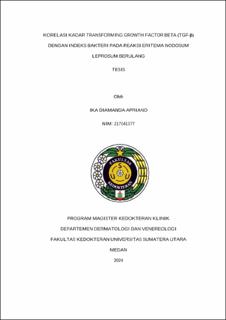Korelasi Kadar Transforming Growth Factor Beta (TGF-β) dengan Indeks Bakteri pada Reaksi Eritema Nodosum Leprosum Berulang
Correlation of Transforming Growth Factor Beta (TGF-β) Levels with Bacterial Index on Recurrent Erythema Nodosum Leprosum Reactions

Date
2024Author
Apriano, Ika Diamanda
Advisor(s)
Lubis, Ramona Dumasari
Nadeak, Kristina
Metadata
Show full item recordAbstract
Introduction : Leprosy is a chronic granulomatous infection caused by infections
of Mycobacterium leprae and Mycobacterium lepromatosis. Erythema nodosum
leprosum (ENL) is an immunological complication of leprosy due to a type III
hypersensitivity reaction. Recurrent ENL reaction was defined as the occurrence of
a second or more episode of ENL reaction after 28 days of the end of the previous
treatment. Transforming growth factor beta (TGF-β) is a suppressor cytokine that
can inhibit the work of macrophages and caused increased of bacterial proliferation.
TGF-β levels and bacterial index have been shown to have an important relationship
in the pathogenesis of ENL reactions.
Subjects and Methods: Observational analytical study with a cross-sectional
approach on 31 subjects aged ≥18 years with recurrent type 2 leprosy reactions.
Basic data recording and subject examination included calculating the bacterial
index of leprosy patients using a slit skin smear to measure TGF-β levels. The
correlation between TGF-β and the bacterial index was analyzed using the
Spearman correlation test.
Results: There was a weak negative correlation between TGF-β levels and bacterial
index in recurrent ENL sunjects (p=<0.05, r=-0.390). The majority of recurrent
ENL subjects were aged 18–25 years and 26–35 years, 10 patients each (32,3%),
male gender, 21 patients (67,7%), highest level of education was secondary
education, 26 patients (83,9%) and more did not work as many as 20 patients
(64,5%). Most of the research subjects experienced recurrent ENL reactions during
MDT as many as 21 patients (67,7%), with majority of subjects have BI +2 wich is
10 patients (32,2%), and the mean value of TGF- β levels in all subjects was 305.12
± 45.77.
Conclusion: There is a weak negative correlation between TGF-β levels and the
bacterial index in recurrent ENL patients.
